
Competent Cells Market Size, Share & Trends Analysis Report By Type (Chemically Competent Cells, Electrocompetent Cells, Ultracompetent Cells), By Application (Cloning, Protein Expression, Mutagenesis), By End-use, By Region, And Segment Forecasts, 2024 - 2030
- Report ID: GVR-4-68040-310-3
- Number of Report Pages: 120
- Format: PDF, Horizon Databook
- Historical Range: 2018 - 2023
- Forecast Period: 2024 - 2030
- Industry: Healthcare
Competent Cells Market Size & Trends
The global competent cells market size was estimated at USD 2.13 billion in 2023 and is projected to expand at a CAGR of 8.10% from 2024 to 2030. Advancements in molecular cloning research, increasing commercial demand for molecular cloned products, and increasing demand for recombinant proteins are some of the factors that drive market growth. Innovations in molecular cloning techniques and the expanding field of synthetic biology drive the demand for competent cells. These cells are essential for cloning DNA fragments, gene expression studies, and constructing genetically engineered organisms.
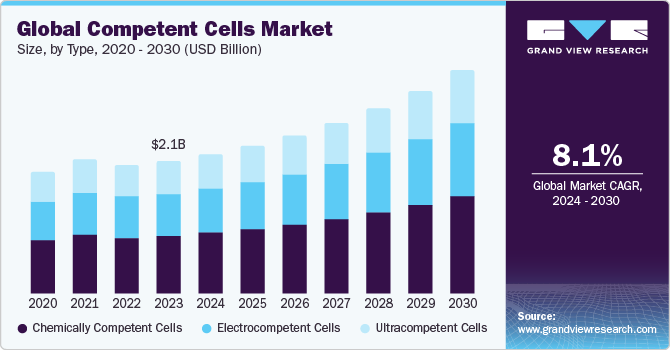
The COVID-19 outbreak has significantly boosted the demand for competent cells over the past two years. Key biotechnology and pharmaceutical companies, as well as manufacturers of competent cells, have ramped up their R&D activities worldwide, employing innovative techniques to develop therapies, kits, and vaccines for COVID-19. For example, in September 2022, CanSino Biologics Inc. obtained emergency use approval from China’s National Medical Products Administration for an inhalable adenovirus-vectored COVID-19 vaccine. This vaccine was developed by cloning an optimized plasminogen activator signal peptide gene into the Ad5 vector along with the full-length gene of the S protein, illustrating the critical role of competent cells in advancing such biotechnological solutions.
Moreover, the increasing emphasis on protein engineering for drug development is driving the growth of the competent cells market. Protein engineering relies heavily on cloning and mutagenesis techniques, which are fundamental for modifying protein sequences over the deletion, substitution, or insertion of nucleotides to create therapeutic proteins. These methodologies enable researchers to develop more effective and safer drugs that are also cost-efficient. For instance, there are currently over 200 peptide and protein drugs permitted by the FDA. Thereby, a heightened focus on protein engineering for drug development is expected to significantly enhance the growth of the market during the forecast period.
In addition, according to a research article published in Science magazine in August 2023, scientists engineered naturally competent Acinetobacter baylyi to detect donor DNA from the genomes of colorectal cancer (CRC) cells, organoids and tumors. Moreover, there is a growing commercial demand for molecular cloned products and recombinant proteins across various industries including pharmaceuticals, biotechnology, and academia. Competent cells play a crucial role in producing these products through genetic engineering techniques, driving the market growth.
Market Concentration & Characteristics
The degree of innovation in the competent cells industry is significant, with new technologies and processes constantly being developed to improve efficiency and effectiveness. Researchers are engaged in developing novel bacterial strains for cloning purposes that prove to be more efficient than the existing strains. Furthermore, use of competent cells gain traction for innovative approaches in drug discovery in the field of medicine and therapeutics.
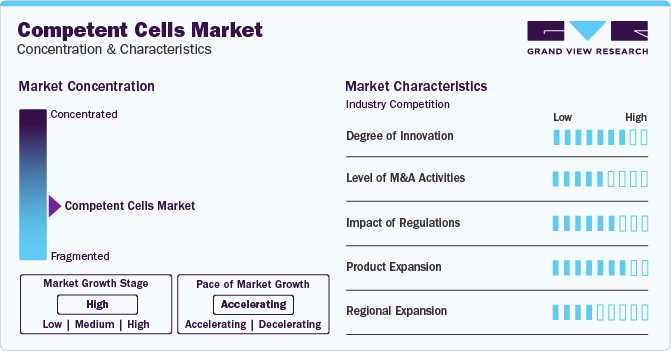
The market is also characterized by the moderate level of merger and acquisition activities undertaken by several industry players. This is due to several factors, including the desire to gain a competitive advantage in the industry and the need to consolidate in a rapidly growing market.
Regulatory requirements governing the use and production of competent cells can pose challenges for market players. Compliance with regulations related to biosafety, genetic engineering, and other aspects can increase operational costs and create barriers to entry for new entrants in the market.
The competent cells industry is experiencing growth due to the expanding applications, advancements in biotechnology & production processes, and increased research and development investments. Numerous industry players are focusing on expanding their product and services portfolio. They are launching novel products in the sectors of cloning, protein expression, cDNA and genomic library construction, high throughput cloning, and cloning unstable DNA.
The industry is currently witnessing a moderate level of regional expansion, with growth prospects driven by an expanding customer base for gene cloning products & services. As scientific awareness of the technique grows globally and access to biotechnology improves in emerging markets a rise in regional expansion initiatives is expected from key players in the market.
Type Insights
The chemically competent cells segment held the largest market share of 43.62% in 2023 due to their high transformation efficiency, suitability for heat shock treatment, and simplicity. Chemically competent cells can be used for a wide range of applications in molecular biology, including cloning, DNA sequencing, and library construction.
The utilization of chemically competent cells is highly valuable in gene expression studies, as they enable researchers to introduce new genetic material into cells for a wide range of applications, including cloning, gene editing, and protein expression. Making cells competent enables scientists to manipulate gene expression levels, study gene function, and investigate regulatory mechanisms within cells.
The electrocompetent cells segment is expected to grow at the fastest CAGR over the forecast period. Electrocompetent cells are important for introducing external DNA into host cells for purposes such as gene cloning, gene expression studies, protein production, and functional genomics. By making cells electrocompetent, researchers can effectively deliver specific DNA sequences into the cells, resulting in genetic modifications and desired phenotypic changes.
End-use Insights
The pharmaceutical & biotechnology companies segment held the largest market share of 41.98% in 2023. In pharmaceutical companies, competent cells are utilized for standard cloning experiments, offering high efficiency for cloning and subcloning processes. They enable the transformation of bacteria with plasmids, which is essential for storing and replicating genetic material. Moreover, advances in molecular cloning technologies have significantly enhanced the efficiency and precision of genetic manipulation processes, increasing the demand for competent cells among pharmaceutical companies engaged in drug discovery, development, and production.
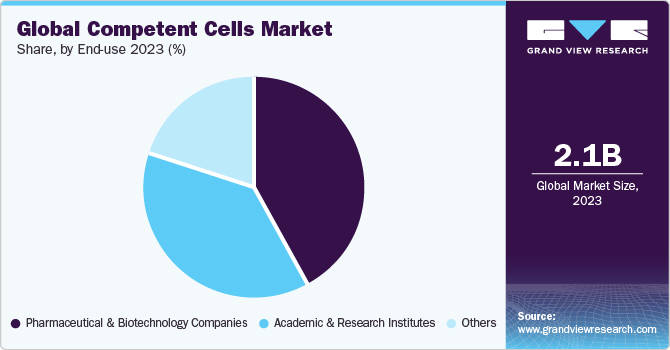
The academic and research institutes segment is expected to witness the fastest CAGR over the forecast period due to their involvement in various research activities that require molecular cloning and recombinant DNA technology. Academic & research institutes utilize competent cells for a wide range of applications, including subcloning, phage display library production, unstable DNA cloning, high-throughput cloning, and mutagenesis. Moreover, academic institutions often collaborate with biotechnology companies and contract research organizations to leverage their expertise in utilizing competent cells for various applications. These collaborations facilitate knowledge exchange, technology transfer, and joint research projects that drive innovation in the field of molecular biology, further propelling market growth.
Application Insights
The cloning segment dominated the market in terms of revenue in 2023 with a market share of 44.78%. The rising prevalence of infectious and non-communicable diseases have escalated the use of competent cells in the research and development (R&D) activities. For instance, according to research published in April 2024, researchers developed recombinant antibodies by phage display technology to treat viral infectious diseases. The phage display libraries used in these technologies were constructed using competent E. coli cells. Furthermore,
The protein expression segment is anticipated to grow at the fastest CAGR of 9.04% over the forecast period. Competent cells are used for the synthesis of proteins and enzymes that can be used in biotechnology and food & beverage industry. In addition, these cells are important in constructing sub-library and phage-display library. The increasing use of competent cells in therapeutics R&D further propels the market growth. For instance, according to a study published in The Nature in February 2024, competent E. coli cells were used for the construction of sub-library in the development of single-chain variable fragment (scFv) against type 1 diabetes.
Regional Insights
North America dominated the market and accounted for a 34.13% share in 2023 owing to the advancements in research related to molecular cloning, the introduction of innovative technologies, and the increasing commercial demand for molecular cloned products. Furthermore, the region benefits from substantial research and development investments, government funding for biotechnology and healthcare research, and highly advanced healthcare infrastructure.
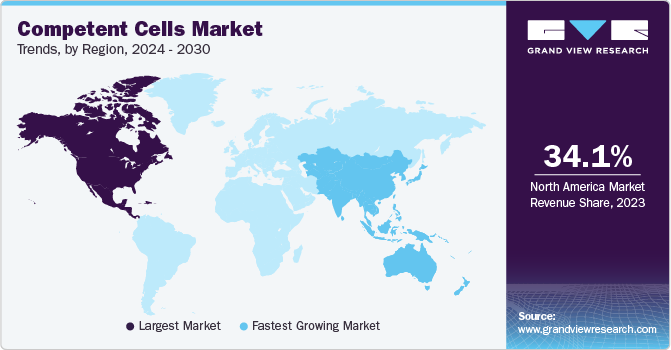
U.S. Competent Cells Market Trends
The competent cells market in the U.S. is expected to grow over the forecast period due to the robust research and development landscape in biotechnology and life sciences, fostering innovation & technological advancements in molecular cloning techniques, and the presence of key players in the country.
Europe Competent Cells Market Trends
Europe competent cells market was identified as a lucrative region in this industry. Strong research & development in biology, pharmaceuticals, and therapeutics, along with the presence of key market players in the region are factors driving market growth.
The competent cells market in the UK is expected to grow over the forecast period. The rise in demand for personalized medicine, the increased prevalence of chronic and hereditary diseases, and the surge in gene therapies have propelled the use of gene cloning techniques in the country.
France competent cells market is anticipated to grow over the forecast period. Application areas such as subcloning, phage display library production, unstable DNA cloning, high-throughput cloning, and mutagenesis are expected to drive the adoption of competent cells in various research projects in France.
The competent cells market in Germany is expected to grow over the forecast period driven by factors such as increased demand for molecularly cloned products, advancements in cloning technologies, and rising research and development investments in biotechnology sectors.
Asia Pacific Competent Cells Market Trends
Asia Pacific competent cells market is anticipated to witness the fastest CAGR of 8.92% from 2024 to 2030 in the competent cells market. The fast growth is due to the extensive developments by India and China in the adoption of protein expression in various applications, along with the emerging focus on proteomics and genomics research.
The competent cells market in China is expected to grow over the forecast period owing to the growing investments and favorable government initiatives in the field of biotechnology. For instance, researchers from Shandong University, China in collaboration with the Washington State University developed Escherichia coli BW25113 (recA+) competent cells having a higher transformation efficiency than the commonly used E.coli strains.
Japan competent cells market is anticipated to grow at a significant CAGR over the forecast period. The increasing demand for recombinant DNA technique products, advancement in molecular engineering, and the rising demand for therapeutic products are some of the factors expected to propel market growth.
The competent cells market in India is anticipated to grow at a rapid rate over the forecast period due to the increasing demand for recombinant DNA technique products, and the rise of government investment in research activities. The advancement of molecular engineering and increasing scientific understanding of therapeutic products used to treat various disorders also contribute to market growth.
Middle East and Africa Competent Cells Market Trends
MEA competent cells market is projected to grow in near future due to the increasing awareness and adoption of cloning techniques for developing recombinant proteins, enzymes, and novel therapeutic tools to combat rising chronic disease prevalence in the region.
The competent cells market in Saudi Arabia is expected to grow over the forecast period due to the substantial investment in the field of biotechnology, increased research activities, and government initiatives supporting scientific advancements.
Kuwait competent cells market is anticipated to witness growth over the forecast period. Kuwaiti institutions are actively collaborating with international researchers and companies in biotechnology research. This collaboration facilitates knowledge transfer and access to cutting-edge technologies, potentially accelerating the market growth.
Key Competent Cells Company Insights
Key players operating in the market are undertaking various initiatives to strengthen their market presence and increase the reach of their products and services. Strategies such as expansion activities and partnerships are playing a key role in propelling market growth.
Key Competent Cells Companies:
The following are the leading companies in the competent cells market. These companies collectively hold the largest market share and dictate industry trends.
- Thermo Fisher Scientific
- Merck KGaA
- Agilent Technologies, Inc.
- Takara Bio Inc.
- New England Biolabs (UK) Ltd.
- Promega Corporation
- Bio-Rad Laboratories
- Roche Applied Science
- Qiagen
- SGI-DNA (Synthetic Genomics, Inc.)
Recent Developments
-
In February 2024, Researchers at Cornell University developed an engineered bacterium, Vibrio natriegens. This bacterium is competent to plasmid DNA and can be engineered within hours and used in synthetic biology research.
-
In February 2024, Bio-Rad Laboratories, Inc. launched the Vericheck ddPCR Replication Competent Lentivirus Kit and the Vericheck ddPCR Replication Competent AAV Kit for cell & gene therapy production.
-
In December 2023, CCM Biosciences (CCM Bio) launched the 5Prime Sciences Business Unit, which focuses on the development and application of proprietary technology in DNA biotechnology, including molecular cloning.
-
In December 2021, Thermo Fisher Scientific Inc., acquired PeproTech, Inc., a developer and manufacturer of recombinant proteins. Including cytokines and growth factors. This acquisition expanded Thermo Fisher’s biosciences product portfolio.
-
In January 2020, SGI-DNA introduced VmaxTM X2 Competent Cells, designed to produce two to four times as much soluble protein in half the time compared to traditional methods using E. coli.
Competent Cells Market Report Scope
|
Report Attribute |
Details |
|
Market size value in 2024 |
USD 2.25 billion |
|
Revenue forecast in 2030 |
USD 3.59 billion |
|
Growth rate |
CAGR of 8.10% from 2024 to 2030 |
|
Actual data |
2018 - 2023 |
|
Forecast period |
2024 - 2030 |
|
Quantitative units |
Revenue in USD million/billion and CAGR from 2024 to 2030 |
|
Report coverage |
Revenue forecast, company ranking, competitive landscape, growth factors, and trends |
|
Segments covered |
Type, application, end-use, region |
|
Regional scope |
North America; Europe; Asia Pacific; Latin America; MEA |
|
Country scope |
U.S.; Canada; Mexico; Germany; UK; France; Italy; Spain; Denmark; Sweden; Norway; China; Japan; India; South Korea; Australia; Thailand; Brazil; Argentina; South Africa; Saudi Arabia; UAE; Kuwait |
|
Key companies profiled |
Thermo Fisher Scientific; Merck KGaA; Agilent Technologies, Inc.; Takara Bio Inc.; New England Biolabs (UK) Ltd.; Promega Corporation; Bio-Rad Laboratories; Roche Applied Science; Qiagen; SGI-DNA (Synthetic Genomics, Inc.) |
|
Customization scope |
Free report customization (equivalent up to 8 analysts working days) with purchase. Addition or alteration to country, regional & segment scope. |
|
Pricing and purchase options |
Avail customized purchase options to meet your exact research needs. Explore purchase options |
Global Competent Cells Market Report Segmentation
This report forecasts revenue growth at global, regional, and country levels and provides an analysis of the latest industry trends in each of the sub-segments from 2018 to 2030. For this study, Grand View Research has segmented the global competent cells market report based on type, application, end-use, and region.
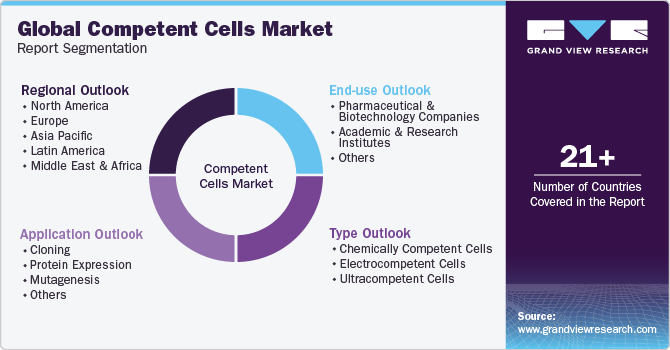
-
Type Outlook (Revenue, USD Million, 2018 - 2030)
-
Chemically Competent Cells
-
Electrocompetent Cells
-
Ultracompetent Cells
-
-
Application Outlook (Revenue, USD Million, 2018 - 2030)
-
Cloning
-
Protein Expression
-
Mutagenesis
-
Others
-
-
End-use Outlook (Revenue, USD Million, 2018 - 2030)
-
Pharmaceutical & Biotechnology Companies
-
Academic & Research Institutes
-
Others
-
-
Regional Outlook (Revenue, USD Million, 2018 - 2030)
-
North America
-
U.S.
-
Canada
-
Mexico
-
-
Europe
-
Germany
-
UK
-
France
-
Italy
-
Spain
-
Denmark
-
Sweden
-
Norway
-
-
Asia Pacific
-
China
-
Japan
-
India
-
South Korea
-
Australia
-
Thailand
-
-
Latin America
-
Brazil
-
Argentina
-
-
MEA
-
South Africa
-
Saudi Arabia
-
UAE
-
Kuwait
-
-
Frequently Asked Questions About This Report
b. The global competent cells market size was estimated at USD 2.13 billion in 2023 and is expected to reach USD 2.25 billion in 2024.
b. The global competent cells market is expected to grow at a compound annual growth rate of 8.10% from 2024 to 2030 to reach USD 3.59 billion by 2030.
b. The chemically competent cells segment held the largest market share of 43.62% in 2023 for type segment due to their high transformation efficiency, suitability for heat shock treatment, and simplicity.
b. Some key market player operating in competent cells market are Thermo Fisher Scientific; Merck KGaA; Agilent Technologies, Inc.; Takara Bio Inc.; New England Biolabs (UK) Ltd.; Promega Corporation; Bio-Rad Laboratories; Roche Applied Science; Qiagen; and SGI-DNA (Synthetic Genomics, Inc.) among others
b. Advancements in molecular cloning research, increasing commercial demand for molecular cloned products, and increasing demand for recombinant proteins are some of the factors that drive the market growth of competent cells over the forecast period.
We are committed towards customer satisfaction, and quality service.
"The quality of research they have done for us has been excellent."




